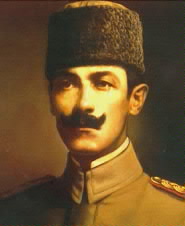Army's success with a raid on Bergama in
June 1919 is dissected in detail here by one
of its architects, Captain Kemal, who was
the chief of staff of the 14th Army Corps,
headquartered in Bandırma.
The victory was short-lived, as the Greek
army returned to occupy Bergama until
14 September 1922.//




Battle Memoir of Kemal Bey, Chief of Staff in Balıkesir
On 6 June 1919, the detachment made up of 70 soldiers from the
infantry regiment of the national forces in Balıkesir was given two
machine guns to use and ordered to travel overland to Soma. In
order to gain two days, I decided to make the trip to Soma by train
and meet up with the detachment there.
However, gathering the troops and securing funds proved to be
quite difficult so the two days I hoped to gain went up in smoke
and I was only able to leave Balıkesir on the train on 8 June,
arriving in Soma that evening and meeting up with the detachment.
My commander Yusuf İzzet Paşa gave me and my train mate, the
commander of the infantry regiment in Balıkesir, a note to pass to
the English representative in Akhisar but it was ultimately turned
over to the English by other means. In any case, I read the note and
in it Yusuf İzzet Paşa protested the advance of the Greek army based
on its own whims and without any official sanction by the Great
Powers.
Yuzuf İzzet Paşa complained that the Greek army had entered this
region without proper notice in order to gain the right to defend the
area it occupied under international law. As a result of the note, the
English made an appeal in Ayvalık for the Greeks to stand down but
they were unsuccessful.

Yusuf İzzet Paşa in Dagistan click here for the first
part of a long TNT series about his exploits 10
months earlier as part of the Ottoman Islamic Army
of the Caucasus. When the Turkish National Army
emerged, Yusuf İzzet Paşa became the commander
of the 14th Army Corps at Bandırma.
With regard to my train travel, there were French soldiers posted
on the Bandırma-Izmir railroad and the French flag flew at the
stations. It would have been necessary to somehow veil the
transport of the detachment by train, as armed soldiers are not
allowed to travel on the train. Consequently, the detachment
traveled overland to Soma.
Prior to my departure from Balıkesir, we had a meeting in which
Vehbi Bey explained that it was not possible to move south from
Giresun (now Savaştepe, about halfway from Balıkesir to Soma)
so we should await the enemy at the provincial (Manisa) border
and fight them there. I, however, thought that the farther away from
our territory that we could engage the enemy the better and that we
ought to attack, rather than defend. Consequently, I felt it would be
best for me to be able to act freely in my operations.

//END of PART ONE//

Hiç yorum yok:
Yorum Gönder